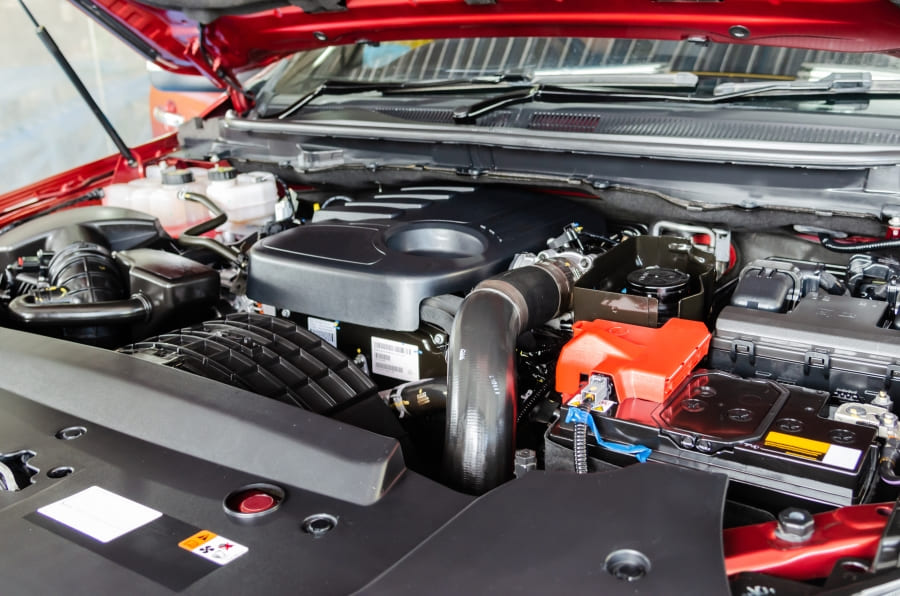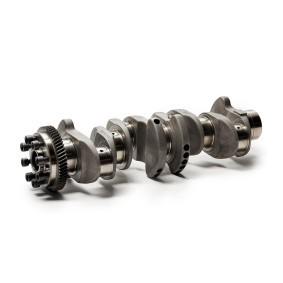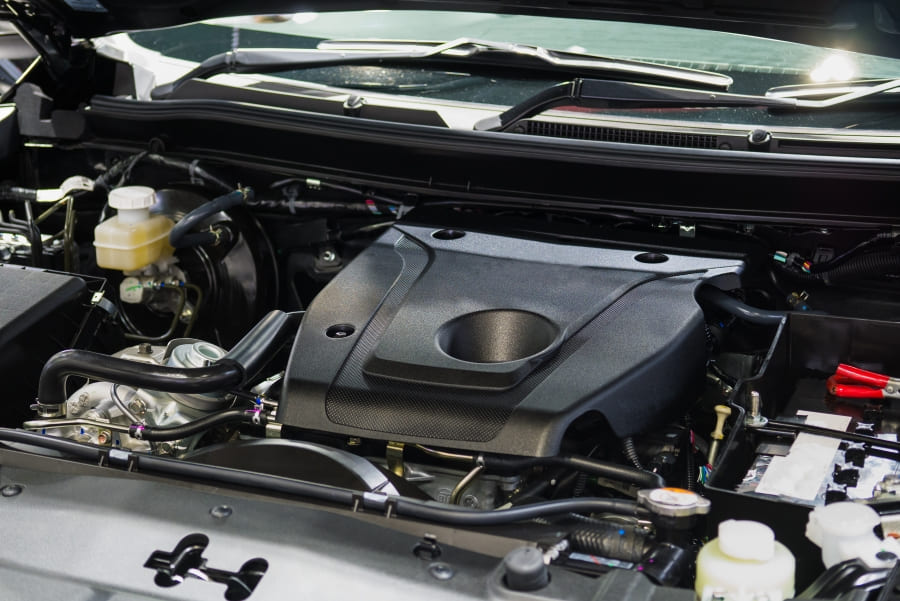
TDCi are turbocharged diesel engines with the Common Rail fuel injection system, installed on Ford cars. They were introduced in 2000. Some of these engines are manufactured in-house by the Ford Motor Company while others are produced by Groupe PSA (now Stellantis).
Features of TDCi engines
All TDCi engines have 4 cylinders and 8 or 16 valves. Depending on the version, the engine block is made of aluminium or cast iron. The cylinder head can also be aluminium or cast iron. The engine is equipped with a turbocharger, often a variable-geometry one. As a rule, the valve timing mechanism uses a belt. However, there are versions with a chain or a combination of belt and chain.
Popular TDCi engines
| Version name | Code | Capacity, L | Number of valves | Max. output, hp | Max. torque, N⋅m | Production start | Ford models equipped with this type of engine |
| Duratorq DLD-414 | F6JA | 1.4 | 8 | 68 | 160 | 2002 | Fusion;Fiesta Mk5. |
| Duratorq DLD-415 | UGJC | 1.5 | 8 | 75 | 185 | 2012 | B-Max; Fiesta Mk5. |
| DLD-416 | GPDA, GPDC | 1.6 | 16 | 90 | 215 | 2005 | Focus Mk1; C-Max. |
| DLD-416 | G8DA; G8DB | 1.6 | 16 | 109 | 240 | 2003 | Focus C-Max; Focus Mk2. |
| Duratorq DLD-418 | HCPA | 1.8 | 8 | 90 | 227 | 2002 | Focus C-Max; Transit Connect Mk1. |
| DLD-418 | FFDA | 1.8 | 8 | 100 | 240 | 2002 | Focus Mk1. |
| DLD-418 | KKDA; KKDB | 1.8 | 8 | 115 | 280 | 2004 | C-Max; Focus Mk1. |
| DLD-418 | QYWA | 1.8 | 8 | 125 | 320 | 2006 | Galaxy Mk2; S-MAX Mk1. |
| Duratorq DW | QXWA | 2.0 | 16 | 140 | 320 | 2006 | S-MAX Mk1; Galaxy Mk2. |
| Duratorq DW | TXDA | 2.0 | 16 | 163 | 340 | 2010 | Kuga Mk1. |
| Duratorq DW | Q4BA | 2.2 | 16 | 175 | 400 | 2008 | Mondeo Mk4. |
| Duratorq DW | KNWA | 2.2 | 16 | 200 | 420 | 2010 | Galaxy Mk2; C-Max. |
| TDCi Duratorq | FMBA | 2.0 | 16 | 130 | 330 | 2002 | Mondeo Mk3. |
| TDCi Duratorq | QJBB | 2.2 | 16 | 155 | 360 | 2004 | Mondeo Mk3. |
| TDCi Duratorq | JXFA | 2.4 | 16 | 115 | 310 | 2006 | Transit Mk6. |

Common malfunctions of TDCi engines
| Malfunctions | Engines |
| The fuel injectors break down rather early. | F6JA; FFDA; JXFA; KKDA; KKDB; FMBA; TXDA; KNWA; Q4BA; QJBB; TXDA; HCPA |
| High risk of thermal damage to the engine pistons due to the injectors over-fuelling. | FFDA; KKDA; KKDB; HCPA |
| Wear of the cylinder-piston assembly causes increased motor oil consumption. | F6JA |
| The turbocharger wears out fast. | GPDA; GPDC; F6JA |
| The front engine mount has a short lifespan. | F6JA |
| The EGR valve quickly builds up carbon deposits. | TXDA; KNWA; Q4BA; UGJC |
| The diesel particulate filter gets clogged after relatively low mileages. | UGJC; Q4BA; KNWA; TXDA |
| The fuel system elements wear out quickly. | G8DA; UGJC; G8DB |
| The camshafts wear out prematurely and their timing chain gets stretched. | GPDA; GPDC; G8DA; QXWA; G8DB |
| The washers under the fuel injectors burn out regularly. | GPDA; G8DA; G8DB; GPDC |
| The engine quickly builds up carbon deposits. | GPDA; G8DA; G8DB; GPDC |
| The hydraulic mounts start leaking after a while. | GPDA; GPDC; G8DB; G8DA |
| The crankshaft damper pulley and crankshaft position sensor break down prematurely. | HCPA; KKDA; QYWA; FFDA |
| The fuel system elements are prone to airlocking. | QYWA |
| A fault can occur early on with the hydraulic lifters, resulting in a knocking sound. | QXWA; TXDA |
| Vibrations cause breakdown of electric wiring and malfunctions of the electronic control unit. | QXWA; TXDA |
| Fuel impurities cause damage to the fuel pump shaft. | JXFA; FMBA |
| The small end of the connecting rods get destroyed. | FMBA; JXFA; QJBB |









Comment